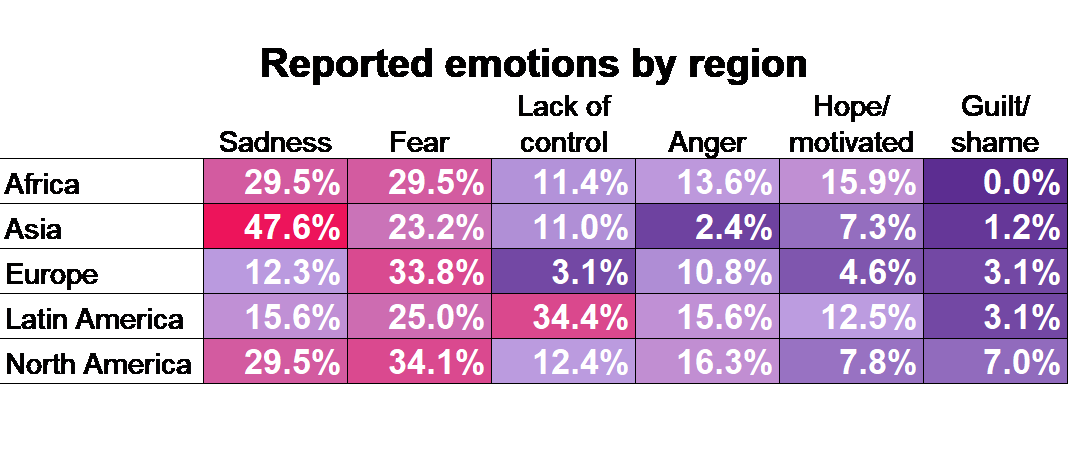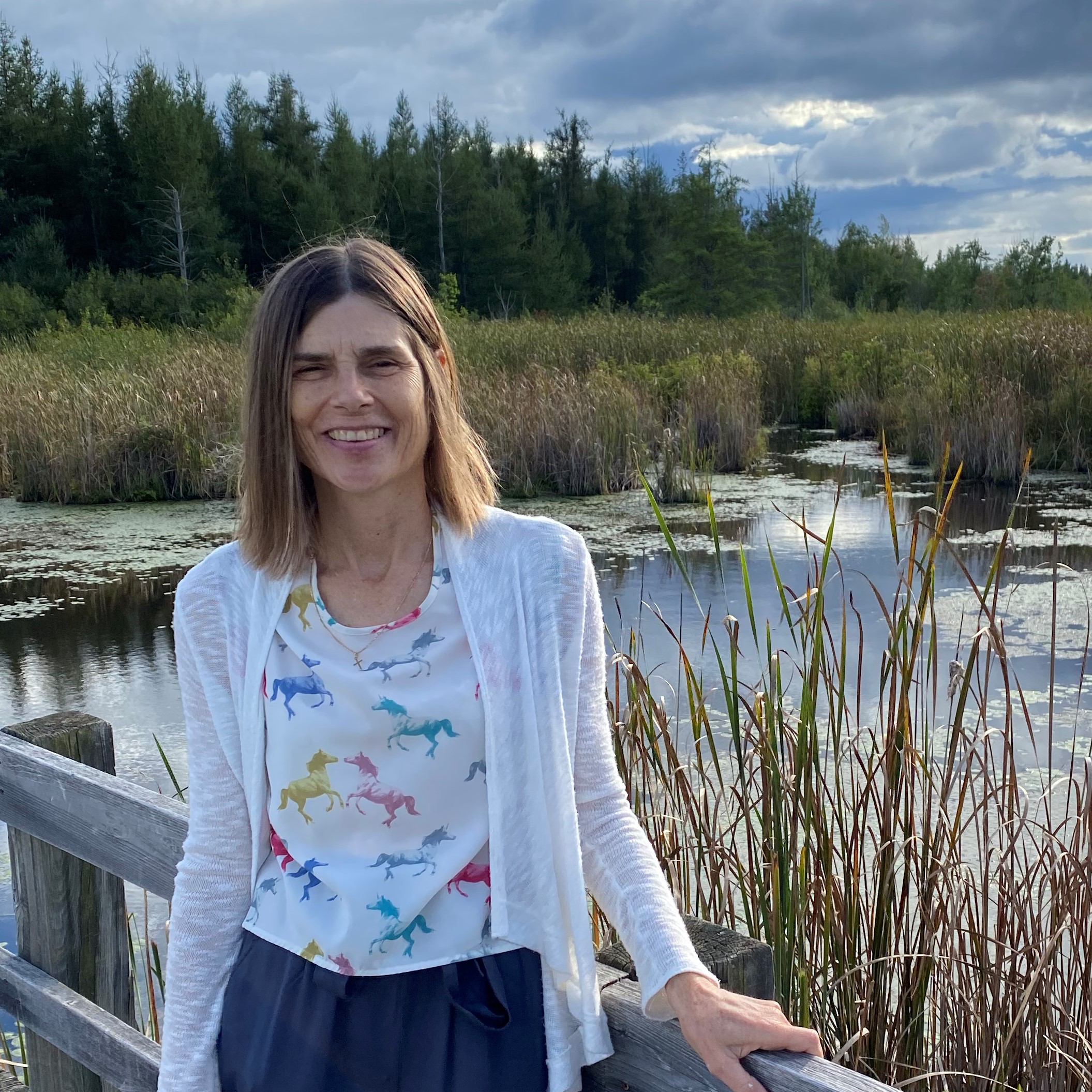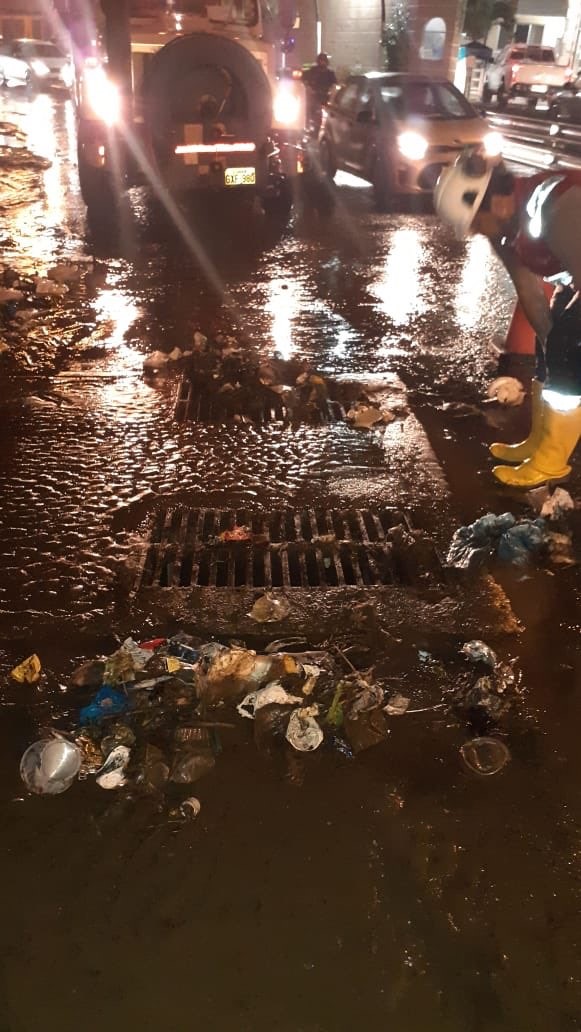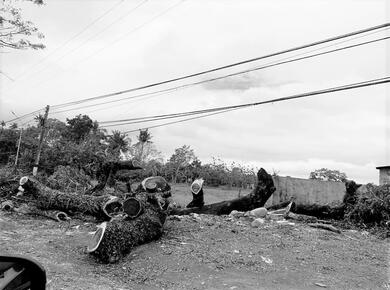Posted: October 5, 2021
(...and why does that matter?)
“It makes me so sad to see the consequences of environmental damage all across the globe. We have not been good stewards of God 's creation; we have destroyed it rather. It makes me feel guilty to be part of the problem instead of part of the solution,” says Sara Viteri, a member of Iglesia Evangélica Mennonita Jesús el Buen Pastor, Guayaquil, Ecuador.
How do you feel about climate change or other environmental problems like pollution? Do those feelings motivate you to respond?
For those that work on environmental problems, these questions are starting to take centre stage. Understanding our emotional responses is key to responding to problems such as climate change.

In the MWC creation care survey, the Creation Care Task Force asked respondents to tell us how they felt about the environmental degradation that they experience. We grouped their responses to show how people are feeling.
So how does that help the church respond more effectively?
1. Fear and sadness are the most prevalent feelings
The most common responses to environmental problems were expressions of fear and sadness.
This is not surprising. Surveys of climate-related emotions report that as people see first-hand the impact of environmental problems, they feel uncertain and scared.
Recent work in environmental psychology emphasizes how these feelings can lead to “implicit denial” of environmental problems: we know these changes are happening, but we feel overwhelmed and powerless, and so choose to avoid facing the problems.
Surprisingly, fear and sadness were as prevalent in more affluent regions as those with fewer resources. Fear was expressed by a consistent one-third to one-half of respondents in both more affluent regions (Europe and the US/Canada), and also in regions that are generally less affluent (Africa, Asia and Latin America).
Responses of sadness varied more, but also did not correlate with levels of affluence (Asian respondents in particular expressed high levels of sadness, whereas Europeans and Latin Americans did not).
So even though some people are clearly affected more by climate change than others, we’re all showing similar emotional responses of fear and sadness.
2. Respondents rarely report hope


What leads to effective action on environmental problems? Although studies suggest there isn’t an easy answer, there’s evidence that people respond effectively when they feel hopeful that they can have an impact.
In this survey, some people did report that experiencing environmental problems and the accompanying emotions does motivate them to action.
“[I feel] scared yet motivated because if I act accordingly for the betterment of the environment then I might make a change,” says Mark Ruzzel Victoria, Lumban Mennonite Bible Church, the Philippines.
However, relatively few people responded with expressions of hope and motivation. Perhaps feelings of sadness and fear are hindering an effective response.
Furthermore, few people in any region reported feeling guilt or shame, even in affluent countries that bear greater responsibility given their resources. Perhaps this is another indication that we’re avoiding this overwhelming problem, or that we don’t personally feel that we have a large impact.
3. Family and community are central motivators

“It makes me uncertain what kind of world will be here for my children and future grandchildren,” says Joan Bueckert, a member of Ottawa Mennonite Church, Ontario, Canada.
Many respondents put their emotions in a communal context. They were thinking of others such as their grandchildren, their church communities or those in parts of the world most affected by climate change.
These results suggest the church has an opportunity to help people respond positively by helping them understand their emotions in the context of their loved ones. Anger, for instance, can move people to respond passionately to what they observe.
We challenge you: don’t avoid your emotions about the impacts of climate change. Learn to understand your feelings, and then transform them into motivation for action.
Prayer

Father, Son and Holy Spirit,
as we reflect on the beauty and diversity of planet earth
and all its beings that you have created to function in harmony with each other,
we are deeply saddened and repentant for the way in which we have behaved,
and the disasters we have contributed to with our irresponsible behaviour.
We have been disobedient to your calling to be good stewards.
As a society, and as your church, we are fearful and sad for what is happening all around us;
for the deep damage and pain we have caused,
especially to so many poor, vulnerable and helpless communities,
to future generations (our own children!),
and to diverse and wonderful creatures you care for.
We all cry out to you in sadness, fear, pain and sometimes anger.
We pray that our feelings of anxiety, despair and discouragement might be transformed into hope by the power of your Holy Spirit.
That as a church, we can wake up from our slumber,
and be motivated to work for change and restoration of your beloved creation.
Welcome to a series on environmental problems and the global church.These stories illuminate a) how Anabaptist-Mennonites are affected by environmental degradation, Story #1: How environmental crises impact church communitiesStory #2: How do environmental problems make people feel?Story #3: How does climate change intersect with other community challenges?Story #4: Are our churches and leaders engaged with creation care?Story #5: How do churches practice creation care?Story #6: What would help churches engage more with creation care? |




Join the Conversation on Social Media
FacebookTwitterInstagramFlickrYouTube